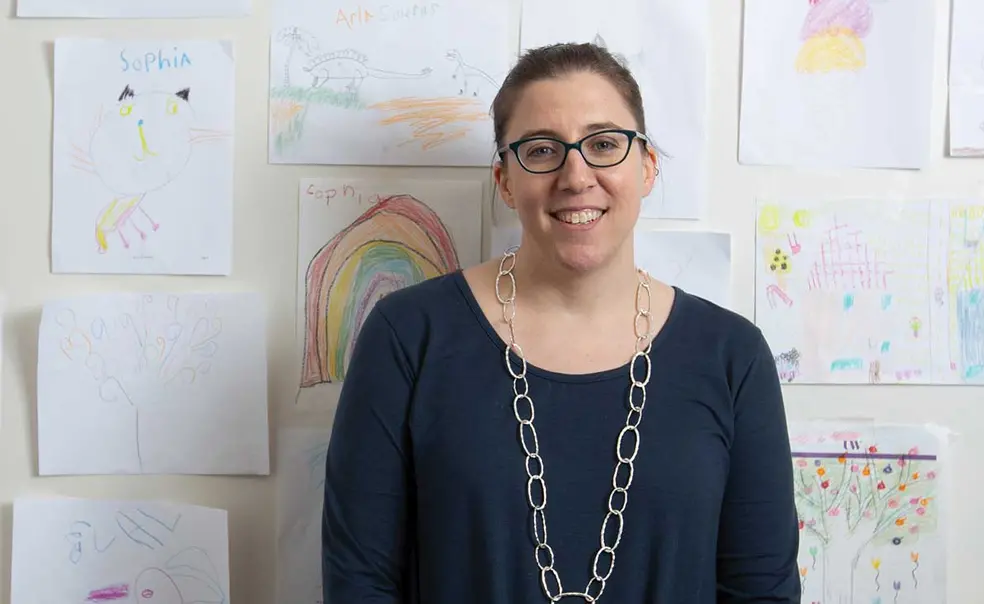Psychology Study Seeks to Understand Transgender Youth
Professor Kristina Olson leads a 20-year study of gender development
When psychology professor Kristina Olson started The TransYouth Project, a longitudinal study of transgender and gender-nonconforming youth, in 2013, she was on a shoestring budget. Then a faculty member at the University of Washington, she took red-eye flights and drove long distances to meet with the parents and children enrolled in the study. “I went to probably 40 states and met about 200 kids myself,” says Olson, who joined the Princeton faculty in September 2020.
Today, Olson is a national figure in the study of gender identity, and her work is funded by grants from the National Institutes of Health, the National Science Foundation, and Princeton. In 2018, she was awarded both the $625,000 MacArthur Fellowship, known as the “genius grant,” and the National Science Foundation’s Alan T. Waterman Award, which provides an outstanding young scientist with a five-year, $1 million research grant. Olson was the only psychologist, and the first woman in 14 years, to win that prize.
Olson launched the TransYouth study after observing a friend’s 5-year-old child, who was living as a boy and playing with a Polly Pocket doll when no one was looking. After getting to know the child and talking to the parents, who were thinking about whether the child would socially transition to live as a girl — such a change is typically defined as adopting the clothing, hairstyle, name, and pronoun of another gender — Olson decided to search the academic literature for studies on the topic. “That’s when I found out there was basically no research about this,” Olson recalls. “I realized I was someone who could do that.”
The TransYouth Project now has 300 participants who are transgender. When initially enrolled in the study by their parents, their ages ranged from 3 to 12. (They had socially transitioned but had not undergone any medical interventions at the time they enrolled.) The 20-year project, which examines gender development and well-being, also studies the sibling closest in age to the transgender child, the parents, and cisgender youth matched by age and gender to the main subjects, for a total of 800 participants in more than 40 states and two Canadian provinces. Study participants meet with members of Olson’s team — now about a dozen postdocs, graduate students, and research staff members — every one to three years and complete annual surveys. The goal “is to get some sense of how children’s gender development grows and changes across their lives, and how their trajectories are similar or not with cisgender youth,” she says.
Olson has found that the mental health of the transgender children who have socially transitioned is similar to that of their cisgender peers. They are no more likely to be depressed and experience only slightly higher anxiety levels. They have good self-esteem. “It’s surprising because studies of transgender adults and teens usually find a big discrepancy” with cisgender adults and teens when it comes to mental health, she says. But “most transgender kids in the United States and the world don’t experience what the youth in our study do: high levels of support,” she points out. Transgender children, for example, are much more likely to be homeless and to face other problems.
Her study also has found that the children who have socially transitioned identify as strongly with their gender as children who identify with their birth gender. The transgender children showed preferences for gender-stereotypical objects such as clothing and toys that are comparable to their non-transgender peers and that are “strong and consistent over time,” Olson says.
Her findings provide insight into transgender youths’ well-being that contradicts previous academic perspectives. “For a long time in the field of psychology, people thought if children thought they were the ‘other gender,’ that was a problem that needed to be fixed,” says Olson, who has published 15 papers so far analyzing the study’s data. “They believed that showing a transgender identity was a sign of an underlying mental health problem. The fact that we have a large number of children doing well who are being supported in their identity provides a counterweight to that belief.” In the past, many experts advised against children transitioning until they entered their teens, but today more recommend that parents support a child’s gender expression at earlier ages.
The president of the American Academy of Pediatrics cited Olson’s work in a 2016 letter encouraging physicians, especially pediatricians, to be supportive of transgender children. Referring to parents who offer “love and acceptance” to “children who just happened not to fit their ‘assigned’ or birth gender,” he wrote, “There appears to be no harm — and possible benefit — from such parent-supported early social transitions.”
Olson used some of the funds from the Waterman Award to create a summer internship program at the University of Washington for undergraduates from across the country. It focused on students from historically underrepresented groups or who would otherwise have a hard time getting the research experience critical for graduate school admission. She hopes to launch a similar program at Princeton.
Olson keeps in touch with many of the parents in the TransYouth Project. They send her photos and updates on their children’s lives. “These parents have told me their life stories, and some have cried in my arms,” she says. “Most parents are doing their best and trying to understand, because they want to support their child.”










No responses yet